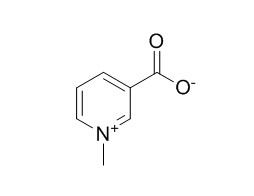Product Name
Trigonelline
Description
Trigonelline is an alkaloid with potential antidiabetic activity that can be isolated from Trigonella foenum-graecum L or Leonurus artemisia. Trigonelline is a potent Nrf2 inhibitor that blocks Nrf2-dependent proteasome activity, thereby enhancing apoptosis in pancreatic cancer cells. Trigonelline also has anti-HSV-1, antibacterial, and antifungal activity and induces ferroptosis.
Solubility
DMSO : 7.14 mg/mL(52.06 mM;Need ultrasonic)
Source
Plants >Leguminosae > Trigonella foenum-graecumLinn. >Plants >other families
Storage
4℃, protect from light
Shipping
Room temperature in continental US; may vary elsewhere.
SMILES
C[N+]1=CC(C([O-])=O)=CC=C1
In Vivo
Trigonelline decreases bone mineralization and tends to worsen bone mechanical properties in streptozotocin-induced diabetic rats. In nicotinamide/streptozotocin-treated rats, Trigonelline significantly increases bone mineral density (BMD) and tends to improve cancellous bone strength. Trigonelline differentially affects the skeletal system of rats with streptozotocin-induced metabolic disorders, intensifying the osteoporotic changes in streptozotocin-treated rats and favorably affecting bones in the non-hyperglycemic (nicotinamide/streptozotocin-treated) rats.
In Vitro
Trigonelline (TG) significantly rescues the morphology of the H9c2 cells. Treatment of cells with Trigonelline attenuates H2O2 induced cell deaths and improves the antioxidant activity. In addition, Trigonelline regulates the apoptotic gene caspase-3, caspase-9 and anti-apoptotic gene Bcl-2, Bcl-XL during H2O2 induced oxidative stress in H9c2 cells. For evident, flow cytometer results also confirms that Trigonelline significantly reduces the H2O2 induced necrosis and apoptosis in H9c2 cells.
